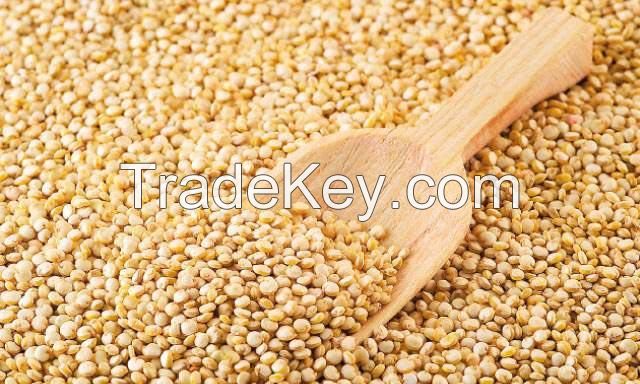


Precio FOB
Obtener el precio más reciente( Negotiable )
|20 Ton Minimum Order
País:
Peru
N º de Modelo:
quinoa, chia seeds, seaweeds, maca, soja, algas, soya
Precio FOB:
( Negotiable ) Obtener el precio más reciente
Lugar de origen:
peru callao
Precio de pedido mínimo:
-
Cantidad de pedido mínimo:
20 Ton
Detalle de embalaje:
15 kg
El tiempo de entrega:
Delivery 30 working days
Capacidad de suministro:
500 Ton per Month
Tipo de pago:
L/C, T/T
Grupo de productos :
Persona de contacto Mr. alex wilfredo
calle 28 de julio 419, pisco, ica
NUTRITIONAL VALUE
For some people, quinoa is a new and nutritious food that has
recently been available at your local supermarket or favorite
restaurant as a substitute for many of the grains that are commonly
consumed. While this may be the situation in many areas of the
world, quinoa has been one of the main food crops of pre-Columbian
cultures in Latin America, and remains an important food for the
Quechua and Aymara peoples of rural areas of the Andean region of
South America 1. In the Quechua language, quinoa is called chisiya,
which means "mother grain".
Quinoa is unique because of its seed quality that can be eaten
similarly to grain. Generally, it is either cooked and added to
soups, or processed into flour to be used in bread, beverages or
porridge. In relation to nutrition, quinoa can be compared in
energy to foods consumed similarly to beans, maize, rice or wheat,
as shown in Table 1. In addition, quinoa stands out as a good
source of quality proteins , Dietary fiber, polyunsaturated fats
and minerals. Although quinoa is a good source of many nutrients,
it is important to consume it as part of a balanced meal along with
many other types of food in order to get good overall
nutrition.
Proteins
The amount of protein in quinoa depends on the variety, ranging
from *0.4% to *7.0% of its edible part 3. Although it generally has
a higher amount of protein in relation to most grains, Quinoa is
best known for their quality. 4. The protein is composed of amino
acids, eight of which are considered essential for both children
and adults. As shown in Table 2, when compared to the essential
amino acid scoring pattern recommended by FAO for children aged 3
to *0 years, quinoa exceeds the recommendations for the eight
essential amino acids. Unlike quinoa, most grains have a low
content of the essential amino acid lysine, while most legumes have
a low content in the sulfuric amino acids methionine and
cysteine.
Dietary fiber
A recent study of four varieties of quinoa showed that dietary
fiber in raw quinoa varies between *3.6 g and *6.0 g per **0 g dry
weight 6. Most dietary fiber was insoluble, With a range of *2.0 g
to *4.4 g compared to the content of 1.4 g to 1.6 g of soluble
fiber per **0 g dry weight. Similar to the total protein value of
quinoa, the value of dietary fiber is generally higher than that of
most grains and lower than that of legumes. Dietary fiber is the
part of plant foods that can not be digested and is important to
facilitate digestion and prevent fecal bowel
obstruction.
Greases
As shown in Table 1, quinoa contains more fats (6.3 g) per **0 g
dry weight as compared to beans (1.1 g), maize (4.7 g), Rice (2.2
g) and wheat (2.3 g). Fats are an important source of calories and
facilitate the absorption of fat-soluble vitamins. Of the total fat
content of quinoa, more than *0% comes from the essential
polyunsaturated fatty acids linoleic (omega 6) and linolenic (omega
3) 3. Linoleic and linolenic acids are considered essential fatty
acids, since they can not Produce the body. Quinoa fatty acids have
been shown to maintain quality because of the high natural value of
vitamin E, which acts as a natural antioxidant 7.
Minerals
On average, quinoa is a better source of minerals in relation to
most of the grains presented in Table 3. Quinoa is a good source of
iron, magnesium, and zinc in particular when compared to
recommendations for daily consumption Of minerals. Lack of iron is
often one of the most common nutritional deficiencies. However,
quinoa, like all plant foods, contains some non-nutritive
components that can reduce the content and absorption of mineral
substances. The most notable are its saponins, which are found in
the outer layer of the quinoa seed and are usually extracted during
processing to eliminate the bitter taste. Quinoa also has a high
content in the oxalate compound, which can bind to minerals such as
calcium and magnesium and reduce its absorption in the body
8.
Vitamins
Quinoa is also a good source of vitamins B2 (riboflavin) and folic
acid compared to other grains, while its thiamine content is
similar to that of other grains and niacin is on average lower, as
shown in Table 4. It also contains sign quantities
come in contact
| País: | Peru |
| N º de Modelo: | quinoa, chia seeds, seaweeds, maca, soja, algas, soya |
| Precio FOB: | ( Negotiable ) Obtener el precio más reciente |
| Lugar de origen: | peru callao |
| Precio de pedido mínimo: | - |
| Cantidad de pedido mínimo: | 20 Ton |
| Detalle de embalaje: | 15 kg |
| El tiempo de entrega: | Delivery 30 working days |
| Capacidad de suministro: | 500 Ton per Month |
| Tipo de pago: | L/C, T/T |
| Grupo de productos : | seaweed |